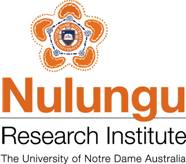
Files
Download Full Text (2.8 MB)
Publication Details
Wooltorton, S., Toussaint, S., Poelina, A., Jennings, A., Muecke, S., Kenneally, K., Remond, J., Schipf, A., & Stredwick, L. (2019). Kimberley transitions, collaborating to care for our common home: Beginnings… (Nulungu Research Papers 2). Nulungu Research Institute. https://researchonline.nd.edu.au/nulungu_research/2/
Abstract
This scoping paper is a preliminary introduction to the aspirations, interrelated literature and research involved in development of the Kimberley Transitions Project. Our focus is on Western Australia’s Kimberley region, a landscape of immense natural and cultural significance. Along with the rest of Australia, and indeed the world in which we all live, the Kimberley is on the verge of major climate, political, social and economic change. The direction of changes being proposed by governments and industry are regularly criticised, both globally and locally, by individuals and organisations concerned about damage to its rich biodiversity and cultural integrity. With the aim of collaboratively generating Kimberley-based responses grounded in local knowledges, a mix of disciplines and emerging international theories, scholars and relevant groups have come together to form a Kimberley-wide practical and shared research agenda. One of the key influences behind the project is an international transitions movement which aims to generate collaborative change incorporating a process of transition. Locally identified issues using local knowledges and capacity are central to its evolution. A conceptual and theoretical framing known as ‘transitions discourse’ is also emerging internationally and nationally, one that foregrounds diverse epistemologies and challenges mainstream economics and associated ideologies, such as neoliberalism. Via the Kimberley Transitions project, Kimberley-based researchers and collaborators aim to support and further document social, cultural and economic change inspired by the transitions movement and informed by transition discourses. It has the Kimberley landscape and people at its heart; a transformative approach featuring cultural healing, intellectual rigour and an ethos aimed at enduring, practical and interconnected sustainable outcomes.
Keywords
Climate, Environment, Culture, Social change, Kimberley, Western Australia





